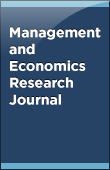


This study examined the nexus between capital flight and economic development in Nigeria. The null hypothesis was that capital flight has no significant relationship with economic development in Nigeria. The study used the auto regressive distributed lag (ARDL) method on data obtained from the Central Bank of Nigeria and the World Bank, for the period 1986–2018, to examine the relationship between capital flight and economic development in Nigeria. The study examined the unit root problem and cointegrating properties of the data. The unit root problem was tested for by using the augmented Dickey–Fuller (ADF) and Phillips–Perron (PP) tests. Findings from ARDL showed an inverse relationship exists between capital flight, real exchange rate, and economic development. This implies that the variables contributed significantly to reduce economic development within the study period. However, a positive relationship existed between economic development and adult literacy rate in Nigeria. By implication, improvements made in providing quality and affordable education tend to have a positive impact on economic development in Nigeria. The study concluded that economic development is strongly influenced by capital flight, real exchange, and adult literacy rates in Nigeria. The study, therefore, recommends that government policies to curb capital flight should be introduced and monitored so as to lead to economic development in Nigeria.